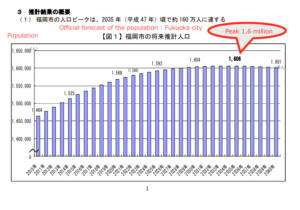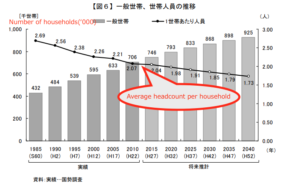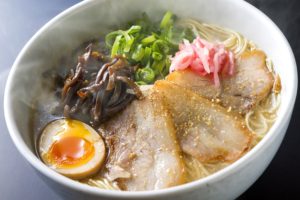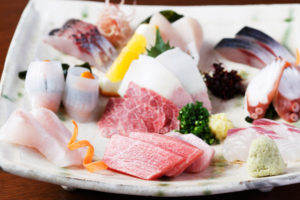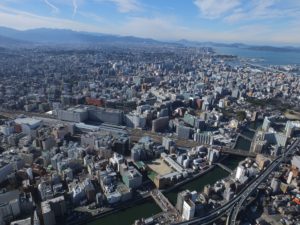
(Fukuoka city: Image was provided by Fukuoka city official site)
As we discussed in the previous post, we always recommend
foreign investors to start looking at Tokyo as the prime location to invest
in properties however, in addition to Tokyo, there are a few big local cities
where attractive investment opportunities exist.
Fukuoka city in Kyushu island is one of them.
Where is Fukuoka city ?
Fukuoka city is one of twelve government-designated cities
(namely large cities) such as Yokohama, Osaka, Nagoya
and has a population of 1.53 million people.(vs. 9.21 million in Tokyo 23 wards)
Here is the latest official forecast of its population and household
in the future announced by the Fukuoka city official.
(Please click the image to enlarge)
Its population will increase until 2035 and
notably the number of household (another important indicator for real estate
investing) will continue to grow until 2040 (or possibly beyond)
In Japanese real estate investing, the population matters so their
future is very bright.
Its gross population is ranked 5th in the government-designated cities.
In terms of population increase and population growth rate,
Fukuoka city tops in twelve cities.
From the global perspective, in ‘Livability ranking’ published by
MONOCLE magazine in London, Fukuoka city is ranked
14th in the world.(Tokyo is No.1 for three years in a row in the same survey)
And in the comprehensive Global Power City Index (GPCI) which analyzes the cities
from wider perspectives, Fukuoka was ranked 36th after Taipei in 2017
among 44 world’ s leading cities.
Tokyo stands at 3rd in the comprehensive world stats.
GPCI evaluates power of cities based on the following viewpoints
: six main functions representing city strength (Economy ,
Research and Development , Cultural Interaction , Livability , Environment , and Accessibility ), and five global
actors who lead the urban activities in their cities (Manager ,
Researcher , Artist , Visitor , and Resident)
In GPCI functional ranking of ‘LIVABILITY’, Fukuoka even surpasses Tokyo and
ranked 13th one place ahead of Tokyo.
Please see each category of GPCI ranking and their web site below.
GPCI FUKUOKA
But why is Fukuoka city livable and powerful so much in the global market ?
The most notable characteristic of Fukuoka city is density and concentration
(It is often called a compact city)
Because of geographically the mountain and the sea are close, various things are
concentrated in a narrow city area.
Both airports and harbors are located just outside the city center,
and everything from administrative facilities
to commercial facilities is densely packed in narrow space,
which offers the great convenience of having a bicycle move or walk
to do anything.
The residential area is also close to the city center, so the workplace
and the houses are close enough to be told that “If it takes as long as 30 minutes
to commute, it is far in Fukuoka.”
There is no hustle to commute in Fukuoka which is a big plus.
According to GPCI index in 2016, Fukuoka’s accessibility to the air port
is ranked 4th in the world which is even higher than Tokyo.
If you have travelled to Fukuoka, you can actually feel it.
It takes virtually10 mins to the city center from the air port by train.
In addition, recently, the mayor of Fukuoka is trying to
make Fukuoka the leader city of south east Asia,
and they are also putting effort into nurturing entrepreneurs through founding support.
Fukuoka is located closer to Busan than Tokyo.
When you walk in the Tenjin area which is business and shipping districts of Hakata
you can see how compact the city is, compared with Shinjuku or Shibuya in Tokyo.
Tenjin area fits almost in a narrow range of about 500 meters from the center and heads
to the edge in 10 to 15 minutes walk.
In another words, the city is very concentrated and everything is within 15 minutes reach.
In order to illustrate the livelihood of Fukuoka, here is the abstract of an article
about the economic growth of Fukuoka which was published on ‘President on line’
in October 2017.
“Large retail facilities such as “Solaria Plaza”, “Solaria Stage” and “Tenjin Core” are located
closely each other.
In Tenjini west street passing through the middle of the downtown area,
fashion brands for young people such as “ZARA” “H & M” decorate the street, and a short
window of fashionable roadside shops fills in between.
People are running all over the street.
In the city of Tenjin, we see a group of foreign tourists walking around by taking carry bags
everywhere, and we frequently see the scene that they use the bus.”
On the top of those global rankings, Fukuoka city is celebrated with the following phenomenons.
-Top 10 food stall cities in Asia
Their food stalls are really nice.
Fukuoka is the only Japanese city to make the list.
-Cities with highest % of young people
1st among government-designated cities
It is the unique strength of the city in the ageing Japan, good for rental
properties.
-Low food prices
1st among 20 metropolitan cities
Delicious but cheap !
In the meantime, does Fukuoka have any issues or risks in the future ?
From the property investing point of view, I believe the prominent challenge
is the renovation of the city’s old buildings.
Compared with Tokyo, there are so many old buildings and facilities there.
They need to be renovated or the area itself needs to be re-developed.
Such re-development of the city will become a also future growth engine
for Fukuoka city but it costs.
There is a re-development plan by Nishitetsu rail way company
to rebuild old buildings in “Tenjin” area over next 10 years.
It is said the size of the redevelopment plan will be 8600 square meters
which is significant and involves the lot of money.
Another issue is maximizing the inbound tourism and global trade.
Fukuoka always encounters competitors like Tokyo, Kyoto and Sapporo.
Fukuoka needs further strengthen the network connecting Asian cities
and major domestic cities such as Tokyo, Nagoya and Osaka.
They want to more strengthen the ties with Asian countries such as Korea
but not to weaken the relation completely with Tokyo.
And lastly, in Kyushu island, Fukuoka seems to stand alone
and other cities in the island are not necessarily enjoying the
spree of economic growth.
So if Fukuoka wants to grow more organically and attract more tourists
in Kyushu region, they may want to develop more economic ties with
other neighboring cities.
P.S.
As I said, Fukuoka city is nationally much renowned for delicious foods such as sea foods and
Hakata Ramen which also attract more tourists from overseas countries.
(Photos are provided by Fukuoka city) .
Toshihiko Yamamoto
Real estate investing consultant and author.
Toshihiko is currently writing a book about the real estate investing in Japan
for foreign investors.
Founder of Yamamoto Property Advisory in Tokyo.
International property Investment consultant and licensed
real estate broker (Japan).
He serves the foreign companies and individuals to buy and sell
the real estates in Japan as well as own homes.
He holds a Bachelor’s degree in Economics from
Osaka Prefecture University in Japan
and a MBA from Bond University in Australia.

